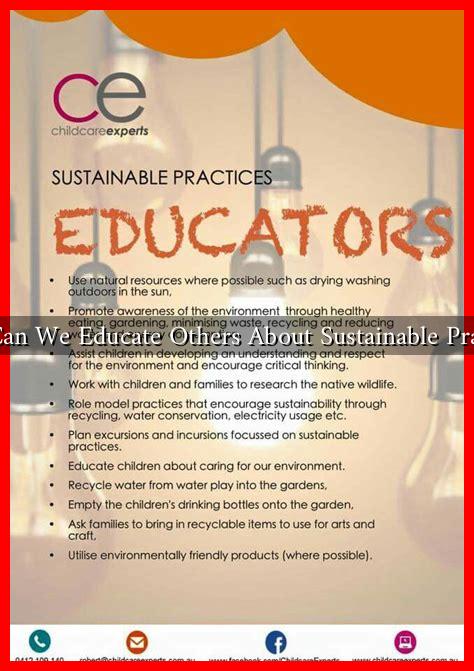-
Table of Contents
- How Can We Educate Others About Sustainable Practices?
- The Importance of Education in Sustainability
- Strategies for Educating Others
- 1. Workshops and Seminars
- 2. School Programs
- 3. Community Outreach
- 4. Social Media Campaigns
- Case Studies of Successful Education Initiatives
- Measuring the Impact of Education
- Conclusion
How Can We Educate Others About Sustainable Practices?
As the world grapples with the pressing challenges of climate change, resource depletion, and environmental degradation, the need for sustainable practices has never been more urgent. Educating others about these practices is crucial for fostering a culture of sustainability. This article explores effective strategies for educating individuals and communities about sustainable practices, supported by examples, case studies, and statistics.
The Importance of Education in Sustainability
Education plays a pivotal role in promoting sustainable practices. According to the United Nations Educational, Scientific and Cultural Organization (UNESCO), education for sustainable development (ESD) empowers individuals to make informed decisions and take responsible actions for environmental integrity, economic viability, and a just society. Here are some key reasons why education is essential:
- Awareness: Education raises awareness about environmental issues and the importance of sustainability.
- Behavior Change: Knowledge can lead to changes in behavior, encouraging individuals to adopt more sustainable practices.
- Community Engagement: Educated individuals are more likely to engage in community initiatives that promote sustainability.
Strategies for Educating Others
There are various effective strategies to educate others about sustainable practices. Here are some of the most impactful methods:
1. Workshops and Seminars
Organizing workshops and seminars can provide hands-on learning experiences. These events can cover topics such as composting, energy conservation, and sustainable gardening. For example, the Green Living Show hosts workshops that teach participants how to reduce their carbon footprint through practical actions.
2. School Programs
Integrating sustainability into school curricula is vital for educating the next generation. Programs like the Eco-Schools initiative encourage schools to implement sustainable practices while teaching students about environmental stewardship. A study by the National Wildlife Federation found that schools participating in Eco-Schools reported a 20% reduction in waste.
3. Community Outreach
Community outreach programs can effectively spread awareness about sustainable practices. Initiatives such as neighborhood clean-up days or tree-planting events not only educate participants but also foster a sense of community. For instance, the Keep America Beautiful campaign engages communities in litter prevention and beautification efforts, promoting sustainability at the local level.
4. Social Media Campaigns
In the digital age, social media is a powerful tool for education. Campaigns that share tips on sustainable living, such as reducing plastic use or conserving water, can reach a wide audience. For example, the #PlasticFreeJuly movement encourages individuals to reduce their plastic consumption and share their experiences online, creating a ripple effect of awareness and action.
Case Studies of Successful Education Initiatives
Several organizations have successfully implemented educational initiatives that promote sustainable practices:
- The World Wildlife Fund (WWF): WWF’s “Earth Hour” campaign not only raises awareness about climate change but also educates participants on energy conservation by encouraging them to turn off lights for one hour.
- Project Drawdown: This initiative provides educational resources on the most effective solutions to climate change, empowering individuals and organizations to take action.
- Local Governments: Many local governments have launched sustainability education programs that include workshops, informational materials, and community events to engage residents.
Measuring the Impact of Education
To ensure that educational efforts are effective, it is essential to measure their impact. Surveys, feedback forms, and follow-up assessments can help gauge changes in knowledge and behavior. For instance, a study by the Nature Research journal found that educational interventions significantly increased participants’ knowledge of sustainable practices and their likelihood of adopting them.
Conclusion
Educating others about sustainable practices is a vital step toward creating a more sustainable future. By utilizing workshops, school programs, community outreach, and social media campaigns, we can effectively raise awareness and inspire action. Successful case studies demonstrate the potential impact of these initiatives, while measuring their effectiveness ensures continuous improvement. As individuals and communities embrace sustainable practices, we move closer to a healthier planet for future generations.


